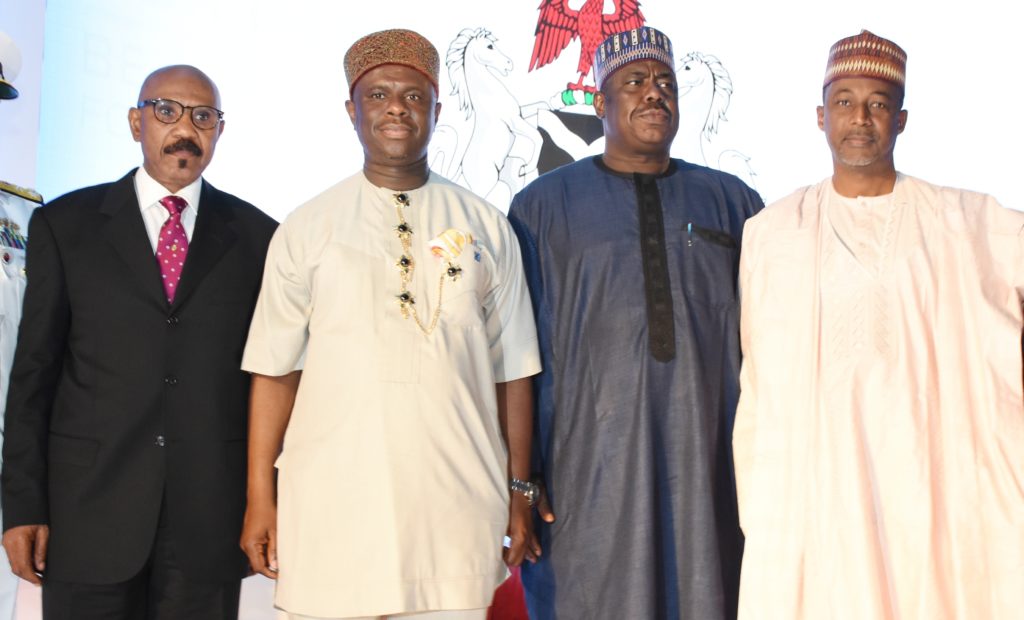The Federal Government has said that for effective contribution of shipping activities to the development of Nigeria’s economy to be realized, there is the need to curb and combat all illegal maritime activities on the Nigerian waters as these crimes continues to constitute impediments to her economic development.
The Minister of Transportation, Hon. Chibuike Rotimi Amaechi who made this known in a keynote address he delivered at an event to mark the World Maritime Day celebration in Lagos with the theme, “IMO 70: Our Heritage, Better Shipping for a Better Future”, said that as long as these crimes continue to pose danger to the Gulf of Guinea and to Nigeria’s maritime domain, the benefits of the theme of this year’s World Maritime Day celebration would continue to be elusive.
Amaechi while noting that the importance of ensuring a safe maritime domain cannot be over emphasized, however added that a safe, secure and efficient shipping industry would surely revitalize and diversify the economy of Nigeria away from crude oil exploration to a maritime hub.
“Therefore, the promotion of sustainable shipping and sustainable maritime development as expressed in the theme of this year’s celebration will stimulate the development of new technologies and innovation, agile maritime security platforms and the development of the maritime infrastructure”, he said.
The Minister who was represented at the event by the Permanent Secretary in the Ministry, Sabiu Zakari, however observed that concerted efforts were being made by the present administration to strengthen the institutional capabilities of the agencies responsible for providing maritime security in Nigeria’s maritime domain and around the Gulf of Guinea region.
According to him,” The Federal Executive Council (FEC) recently approved the procurement of new security architecture for the Nigerian Maritime Administration and Safety Agency (NIMASA), which involves the acquisition of new platforms and other logistics required to enable the agency perform its statutory functions of securing the Nigerian waters in conjunction with the Nigerian Navy”.
He stated that Nigeria as a member-state of the International Maritime Organization (IMO), a specialized United Nations (UN) agency, was responsible for ensuring safety and security of shipping and protection of the marine environment even as he recalled that the IMO, initially, was restricted to safety related issues, but over the years, its mandate was expanded to environmental considerations, legal matters, technical cooperation, maritime security and many other issues affecting the overall efficiency and effectiveness of shipping.
On the achievements of the IMO, the Minister said,” Among the most recent achievements of the IMO is the adoption of the Initial Strategy on the reduction of Greenhouse Gas emissions from ships, which is a policy commitment targeted at completely phasing out the Greenhouse Gas emissions from ships in line with the goals of the Paris Agreement. Furthermore, the global sulphur limit, referred to as ”IMO 2020″ specifies a reduction in the sulphur content of fuel oil used by ships. As a means of ensuring sustainable use of maritime resources for future purposes, the IMO encourages member states to ratify and domesticate legal instruments for uniform implementation and enforcements of its regulations and laws.
“As you may be aware, maritime activities are essential to the world’s economy, as about 90% of the world’s cargo is carried by ships on the sea as it is the most cost-effective way of moving goods and raw materials around the world. Nigeria enjoys a larger share in the movement of these cargoes, due to its location along the Gulf of Guinea which is a transit and strategic route for movement of most cargoes across Africa. Though, the route has witnessed a lot of maritime crimes, which has affected shipping activities around the region, it is imperative that the route is secured to fully harness the benefits of the maritime industry.
“With a coastline of 852 kilometres bordering the Atlantic Ocean in the Gulf of Guinea and a maritime area of over 46,000, Nigeria is no doubt a maritime destination. Statistics show a total freight cost estimate of between $5 billion and $6 billion annually, while the maritime component of Nigeria’s oil and gas industry is worth an estimated $8 billion alongside seaborne transportation, oceanic extractive resource exploitation and export processing zones.
“As we celebrate today and deliberate on present and future challenges of the maritime industry with a view to proffering viable solutions, let us also take into consideration the possible impact of innovative technology in shipping, bearing in mind that technology is key to a safer and more sustainable future for shipping and the maritime industry”.
Photo: From Left: The Managing Director National Inland Waterways Authority, Senator Olorunibe Mamora, The Director General NIMASA, Dr. Dakuku Peterside, The Minister of State for Works, Engr. Mustapha Baba Shauri and the Permanent Secretary, Federal Ministry of Transportation Mr. Sabiu Zakari at the 2018 World Maritime Day Celebration in Lagos Tuesday.
Send your news, press releases/articles to augustinenwadinamuo@yahoo.com. Also, follow us on Twitter @ptreporters and on Facebook on facebook.com/primetimereporters or call the editor on 07030661526, 08053908817.

